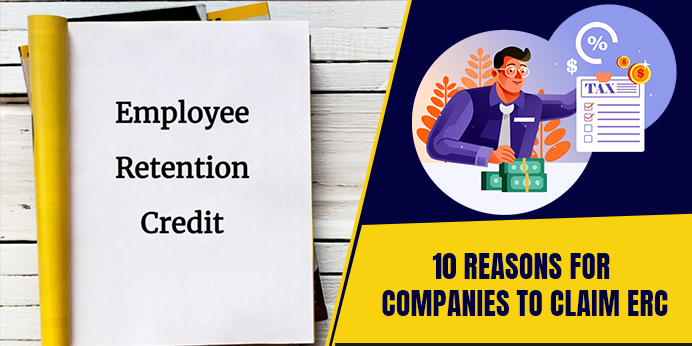ERC Qualification Requirement: Know Your Eligibility

Many businesses have been affected financially due to covid-19 pandemic. It’s been tough for them to bare the loss of business. Thanks to employee retention credit (ERC) for being a significant relief in helping businesses to retain their employees on payroll and continue to run operations.
It helps employers to pay salaries to their employees while facing a financial crisis caused by the pandemic. However, it requires certain eligibility criteria to be followed to qualify for the tax credit under the program established based on the Coronavirus Aid, Relief, and Economic Security (CARES) Act. Therefore, it is important to understand the ERC qualifications since the program is no longer in action but allows some companies who want to claim for the loss that occurred between 2020 to 2021 in exchange for large credit amounts. In order to do so, this ERC eligibility guide helps you understand how this program works, who can qualify for ERC, and how to claim it.
Importance of understanding your employee retention credit eligibility in 2023
As an employer, understanding your eligibility for the employee retention credit plays an important role so as to plan accordingly for the business.
As the name suggests, credit helps business to retain their employees by helping them with continuous employee payment during a period of economic downturn.
ERC can only be dispersed to employers who have seen a significant decline in gross receipts or have been subjected to a government shutdown order. In addition to eligibility, the employer must have maintained its workforce at 80% of its pre-downturn level. When an employer meets the criteria, the credit can surely be claimed against payroll taxes equal to 50% of the wages paid to employees during the period of economic downturn.
The ERC works as a relief for employers who are struggling to keep their businesses during tough economic times. With the eligibility criteria in mind, you as an employer can take an informed decision on how to best use ERC to help maintain your business workforce.
ERC Eligibility: Understanding Who Qualify for it

The employee retention tax credit provides a proven solution for businesses to minimize the cost of employee retention or rehiring employees.
If an employer has experienced a complete or partial operations shutdown due to the Covid-19 pandemic, or a significant decrease in gross receipts, chances are they are eligible. The credit is available for qualifying wages paid from march 13, 2020, through December 31, 2020.
ERC Eligibility Requirements: How to Qualify
The Employee Retention Credit is a tax credit for businesses that faced a loss of profit during the pandemic in order to claim for retaining employees and paying wages.
No matter what the size of the business it is, the credit is available for all those who are significantly affected by the pandemic, including those that have had to shut down operations or reduce hours. That means, if a business comes across a decline in revenue or had to shut down its operations due to the pandemic, they are more likely to be eligible.
The credit is available against the wages paid from March 13, 2020, through December 31, 2020. Businesses can claim the credit for up to 50% of qualified wages, which in turn goes to a maximum of $5,000 per employee.
According to ERC qualification, know if your business is impacted in any of these ways, you are qualified:
- Fully or partially suspended operations limiting commerce, travel, or group meetings due to Covid-19 during any calendar quarter in 2020 due to government orders
- Experienced a significant decline in gross receipts in 2020 and during the first three quarters of 2021
10 Reasons For Companies to Claim ERC
1. Revenue reduction in any quarter of 2020 and/or 2021
A drop in revenue confirms that a company was affected by the pandemic since most industries were majorly disrupted and were forced to adapt.
2. Full or partial suspension of your operations
Complete or partial shutdowns of businesses during the pandemic due to government restrictions are one of the major reasons to be eligible for ERC.
3. Shutdowns of supply chains or vendors
Shutdowns of supply chains and logistics affected by the pandemic – especially for overseas trading considering that countries locked down their borders.
4. Reduction in services offered
Businesses have seen a reduction in the services they offered. When a business supply chain is reduced, or it was a regulation that forced businesses to cease in-person operations, both result in a reduction in offerings leaving a negative impact.
5. A disruption in your business
A major disruption in the business qualifies it for an employee retention tax credit. It is important to carefully lay out which reason is directly affected your business.
6. Inability to visit a client’s job site
Businesses with physical presence faced a challenging time due to the pandemic. They are in desperate need and are often gets qualified for ERC.
7. The inability to deliver the goods and materials to suppliers
One of the critical reasons for companies to get ERC is their supply chain issues. Those suppliers who were unable to make deliveries of the goods and materials need support from the government.
8. Change in job roles and functions
Many companies needed to lay off employees as well as to change roles within companies because of the huge impact on the business.
9. Lack of travel
Traveling businesses were also got affected by the pandemic since flights got canceled. Due to the lack of travel, businesses in almost every industry faced a tough time. Thus, this reason helps them to be eligible for the ERC to apply.
10. Lack of group meetings
Lockdowns, quarantine, and other restrictions made in-person meetings impossible to happen. Normal meetings got changed. Instead of meeting up weekly, there were no meetings happened which affected the overall strategy of the business. This lack of group meetings at the workplace became one of the major reasons why companies are eligible and need ERC.
ERC Eligibility – FAQs
Q: Am I eligible for employee retention credit in 2023?
If you haven’t claimed it yet after the pandemic even if your business is recovered from the losses in gross receipts, you can claim it now in 2023.
In fact, wages paid after March 12, 2020, by the business for three years can assess their eligibility. Qualifying wages have to be paid between march 12, 2020 through September 30, 2021.
Q: How to know whether you are eligible for the ERC?
Review your records to see if you can qualify for ERC and follow the given steps.
- Submit a quick form to see if you qualify
- Fill out an application and an ERC expert will be in touch shortly.
- If you know you can qualify, create a plan for using your credit.
- Some business owners who qualify may receive an advanced payment in the form of a loan.
Q: What industries will be qualified for the ERC?
There is a wide range of businesses that can meet the ERC eligibility requirements, some of the industries include Construction, Real estate, Restaurant, Education, Industrial, Hospitality, Not-for-profit, Technology, Retailers, Gyms, and Wholesalers.




Write a reply or comment
You must be logged in to post a comment.